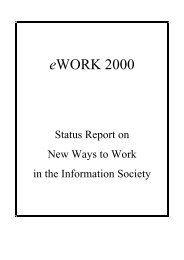Proceedings of 8th European Assembly on telework (Telework2001)
Proceedings of 8th European Assembly on telework (Telework2001)
Proceedings of 8th European Assembly on telework (Telework2001)
Create successful ePaper yourself
Turn your PDF publications into a flip-book with our unique Google optimized e-Paper software.
166such as students, and to smooth the transfer <str<strong>on</strong>g>of</str<strong>on</strong>g> unemployed into permanent work arrangements.Temporary work is spreading fastest and widest in countries in which strict dismissal protecti<strong>on</strong>laws make it harder for companies to employ workers open ended. If intended, governments inthese countries could employ measures to counteract the trend.Job tenure has remained largely unchanged in almost all OECD countries (with the excepti<strong>on</strong> <str<strong>on</strong>g>of</str<strong>on</strong>g> theUSA). This may be explained by the increasing need to tap the tacit knowledge <str<strong>on</strong>g>of</str<strong>on</strong>g> the workforceand develop work envir<strong>on</strong>ments that foster innovati<strong>on</strong>. Both are made easier by a workplaceculture in which trust and experimentati<strong>on</strong> can simultaneously occur. The need for trust withingroups <str<strong>on</strong>g>of</str<strong>on</strong>g> co-operating individuals acts as a limit to the spread <str<strong>on</strong>g>of</str<strong>on</strong>g> atypical employment formssuch as short-term work c<strong>on</strong>tracts, but also freelancing. Labour markets that rely <strong>on</strong> electr<strong>on</strong>icrepresentati<strong>on</strong> <str<strong>on</strong>g>of</str<strong>on</strong>g> market participants in general present a magnified ‘trust dilemma’ becauseobtaining the informati<strong>on</strong> needed to assess some<strong>on</strong>e’s characteristics is even more difficult because<str<strong>on</strong>g>of</str<strong>on</strong>g> the diminished informati<strong>on</strong> richness <str<strong>on</strong>g>of</str<strong>on</strong>g> the electr<strong>on</strong>ic medium as compared to face-to-facecommunicati<strong>on</strong>.With regard to work c<strong>on</strong>tent and the applied skills <str<strong>on</strong>g>of</str<strong>on</strong>g> workers, a more frequent change <str<strong>on</strong>g>of</str<strong>on</strong>g> functi<strong>on</strong>,job enrichment and job enlargement, but also deskilling are strategies companies use to increasetheir flexibility. One the higher end <str<strong>on</strong>g>of</str<strong>on</strong>g> the skills/qualificati<strong>on</strong> spectrum, (mostly) informal c<strong>on</strong>tractsbetween employer and worker have been changed so that more resp<strong>on</strong>sibility over structuringthe work is handed over to employees. As boundaries <str<strong>on</strong>g>of</str<strong>on</strong>g> work relati<strong>on</strong>ships become blurred andmanagement by objectives instead <str<strong>on</strong>g>of</str<strong>on</strong>g> instructi<strong>on</strong>s is introduced, workers gain freedom <str<strong>on</strong>g>of</str<strong>on</strong>g> acti<strong>on</strong>,but have to pay for this by taking <strong>on</strong> the duty <str<strong>on</strong>g>of</str<strong>on</strong>g> structuring their work in a way that enables themto cope with it. These changes take place inside <str<strong>on</strong>g>of</str<strong>on</strong>g> regular employment relati<strong>on</strong>ships, althoughthey may to some extent prepare employees for working self-employed. On the lower end <str<strong>on</strong>g>of</str<strong>on</strong>g> thequalificati<strong>on</strong> spectrum, deskilling can be observed as the know-how that formerly was embodied inworkers has been codified and automated in computer systems. Such deskilling benefits companiesbecause they can now draw a greater share <str<strong>on</strong>g>of</str<strong>on</strong>g> their staff from the c<strong>on</strong>tingent workforce whichenables them to cut their payroll. In this case, ICTs increase <strong>on</strong>ly company-centred flexibility,whereas workers lose bargaining power.In any case, the available data c<strong>on</strong>firm that the stability and c<strong>on</strong>tinuity <str<strong>on</strong>g>of</str<strong>on</strong>g> employment structureshave been underestimated by many observers and commentators. Developments are not uniformand are not unidirecti<strong>on</strong>al. But there is the possibility that available data c<strong>on</strong>ceal many features<str<strong>on</strong>g>of</str<strong>on</strong>g> work that have been undergoing significant, if not fundamental change, but are not reflected inbasic features <str<strong>on</strong>g>of</str<strong>on</strong>g> work such as the type <str<strong>on</strong>g>of</str<strong>on</strong>g> formal c<strong>on</strong>tract. Against this background, the ILO (2001:n.p.) states that ‘employment stability is no indicati<strong>on</strong> <str<strong>on</strong>g>of</str<strong>on</strong>g> the absence <str<strong>on</strong>g>of</str<strong>on</strong>g> change’. This change,however, does seem largely to take place inside regular employment relati<strong>on</strong>ships. Rather than anextincti<strong>on</strong> <str<strong>on</strong>g>of</str<strong>on</strong>g> the regular employment relati<strong>on</strong>ship, we agree with Kleinhenz (1998) who foreseesa gradual change towards a redefiniti<strong>on</strong> <str<strong>on</strong>g>of</str<strong>on</strong>g> regular employment models in the EU which thenwill encompass patchwork careers, stints in self-employment as well as dependent employment,different work time models, etc., without sacrificing basic social insurance standards.








